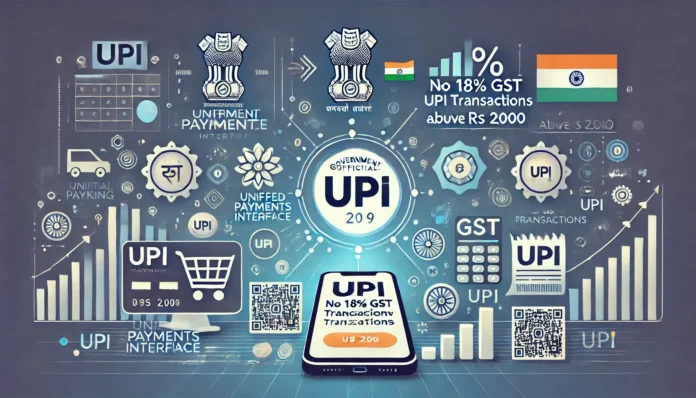Recent Reports Spark Public Concern
In recent days, reports began circulating on social media and certain online platforms suggesting that the Indian government was considering imposing an 18% Goods and Services Tax (GST) on UPI transactions exceeding Rs 2,000. The alleged move, if true, would have had significant implications for India’s booming digital payment ecosystem, affecting millions of daily users who rely on UPI for quick and free transactions.
The reports sparked a wave of public concern and confusion, with many questioning the government’s commitment to promoting cashless transactions and digital inclusion.
Viral Social Media Claims
The origin of the rumors appears to be a combination of misinterpreted statements, speculative media content, and unverified social media forwards. Some viral posts claimed that the government was planning to levy GST on every UPI transaction above Rs 2,000 in the form of a service charge, classifying such payments as a “taxable service.”
Screenshots of supposed government circulars, GST council meeting notes, and news headlines added to the confusion, leading many to believe that this policy shift was imminent.
Government Denies Any Such Proposal
In response to the growing speculation, the Ministry of Finance issued a statement clarifying that no such proposal is under consideration. The statement emphasized that UPI payments will continue to remain free of GST charges, regardless of the transaction amount.
“There is no proposal to impose 18% GST on UPI transactions above Rs 2,000. Digital payments continue to be encouraged and promoted as part of India’s financial inclusion mission,” the ministry said.
The clarification was also echoed by government officials on Twitter (X), where they urged citizens to rely on official sources for accurate information.
RBI and NPCI Back the Clarification
Officials from the Reserve Bank of India (RBI) and the National Payments Corporation of India (NPCI) also backed the government’s clarification. They reiterated that UPI remains a free and seamless platform for peer-to-peer and merchant transactions, and that any changes to the fee structure would be transparently discussed and publicly announced through the appropriate channels.
The NPCI currently bears the cost of operating the UPI infrastructure, with some support from banks and the government’s incentive schemes. In April 2023, the Finance Ministry had announced a Rs 1,500 crore incentive scheme to support UPI and RuPay debit card transactions for FY 2023-24.
The Origins of the Confusion
So how did this controversy start?
Some experts suggest that the rumors may have stemmed from ongoing discussions within financial circles about monetizing the UPI ecosystem to ensure its long-term sustainability. Last year, the RBI released a discussion paper on charges in payment systems, inviting stakeholder comments on whether and how digital payment systems like UPI should be charged.
While the discussion included potential fee models, there was no mention of GST imposition on end users, let alone a blanket 18% tax on transactions above a certain value.
However, misreporting or misinterpretation of these deliberations likely triggered a snowball effect, leading to the current round of rumors.
Digital Payments in India: A Success Story
India’s UPI ecosystem has grown rapidly over the past few years. As of March 2025, UPI clocks over 13 billion transactions a month, with an average daily volume crossing Rs 2 lakh crore.
The platform, launched in 2016, has revolutionized digital payments in India. It has facilitated financial inclusion, empowered small merchants, and drastically reduced dependency on cash.
UPI transactions are interoperable, instant, and available round the clock, and the absence of charges on peer-to-peer (P2P) and peer-to-merchant (P2M) payments has been a major driver of its adoption.
Industry Reaction
Fintech leaders and banking industry representatives welcomed the government’s clarification. Many highlighted that imposing GST on UPI transactions would not only have hurt users but also discouraged adoption, especially among small merchants and low-income users.
"The success of UPI lies in its simplicity and cost-effectiveness. Any taxation would have created friction and hurt India’s digital push,” said the CEO of a leading fintech startup.
Others noted that sustainable models to fund digital infrastructure are necessary, but that user-facing charges or taxes are not the solution.
Opposition and Public Voices
Political leaders across the spectrum also weighed in. Opposition leaders initially slammed the reports, terming them as “anti-poor” and “anti-digital India,” urging the government to roll back any such move. After the Finance Ministry’s clarification, some welcomed the decision, while others demanded better communication from the government to avoid such confusions.
Meanwhile, users on social media expressed relief, though many remained wary. Some called for the regulation of misinformation, while others stressed the need for transparency in digital payment policy discussions.
What’s Next?
While the government has quashed the rumors, the debate has reignited questions about the long-term business model for UPI. With the system scaling rapidly, stakeholders have emphasized the need for a sustainable ecosystem that supports innovation and security without burdening users.
The RBI and NPCI are likely to continue exploring models where merchant charges or government subsidies sustain the infrastructure. But for now, users can rest assured that their UPI transactions above Rs 2,000 will not attract any 18% GST.
Final Word
In a digital age, where misinformation can travel faster than facts, it’s crucial to verify such claims from official government sources before reacting or sharing. The Indian government remains committed to boosting digital transactions and ensuring financial inclusivity. The idea of taxing UPI transactions with an 18% GST was never on the table — and it’s important that such rumors are dispelled quickly and effectively.



